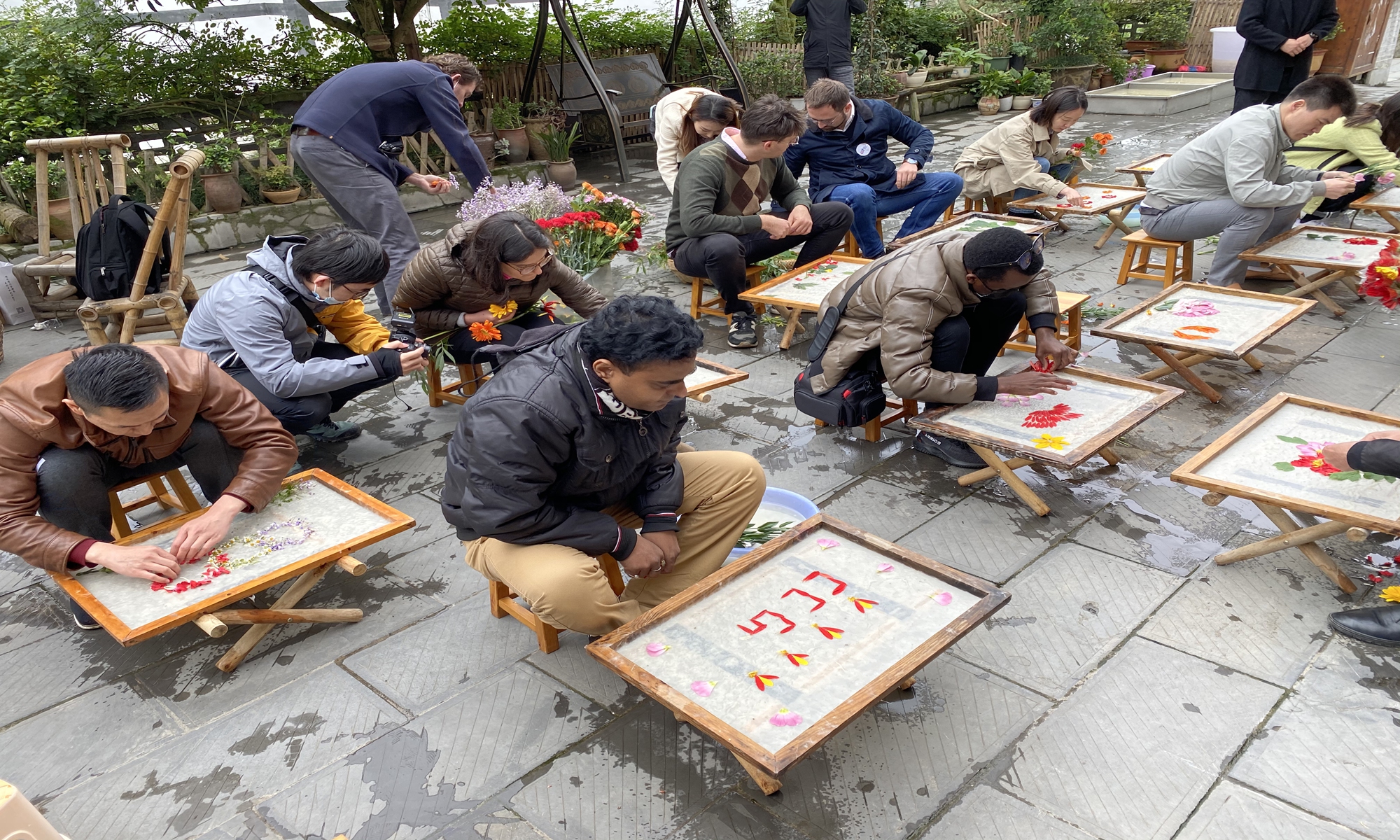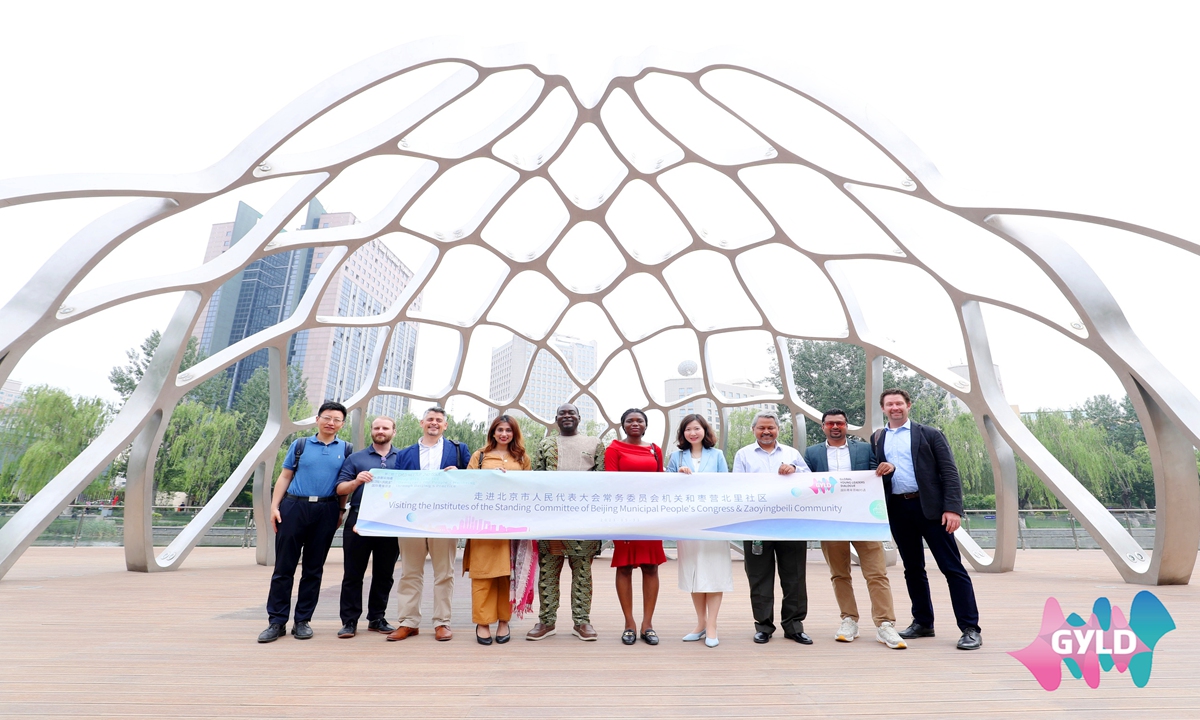IN-DEPTH / IN-DEPTH
Xi’s letter encourages global youths to experience China, enhance understanding, and achieve mutual success
Young friends
Editor's Note:
Chinese people believe that letters are as valuable as gold. For thousands of years, letters, across mountains and oceans, have been delivering the writers' sentiments and conveying friendship and expectations.
Xi Jinping, general secretary of the Communist Party of China (CPC) Central Committee and Chinese president, has managed to find time to reply to some letters sent to him from different sectors of the society and different parts of the world despite his busy work schedule.
Through his letters, Xi has corresponded with people from all walks of life on numerous occasions, part of a series of excellent China stories in the new era.
The Global Times traced and contacted some of the recipients of Xi's letters, to hear the inspiring stories behind the letters and their communications with the Chinese president.
In April 2021, young participants from different countries with diverse cultural and academic backgrounds, embarked on their China Tour journey, an activity launched by the Global Young Leaders Dialogue (GYLD), to explore the Chinese path of development and experience splendid and inclusive Chinese culture.
In this installment, we speak to two young international participants of the tour, also young leaders of the GYLD, who shared the encouragement they received from the president's reply letter, their experiences in China, as well as their insights on serving as a bridge to promote exchanges and dialogue between China and the rest of the world.

Global youths learn about handmade paintings made from fresh flowers, a source of income for Huamao village residents, in Zunyi city, Southwest China's Guizhou Province, in April 2021. Photo: Courtesy of GYLD
"I felt the recognition of President Xi to global young people in China. It's very important for the program and for young foreign participants in it," Joshua Dominick, an American youth who has lived in China for over 20 years, told the Global Times recently.
Two years have passed since the GYLD program and young participants received a reply letter from Chinese President Xi on August 10, 2021. At the recent GYLD forum held by the Center for China and Globalization (CCG) on August 12, which coincided with the two-year anniversary of receiving the letter from Xi, and also marked the International Youth Day as set by the United Nations, Dominick recalled to the Global Times how he felt when he read Xi's reply letter.
For many people looking for more opportunity or looking to learn from China, such recognition means a lot and encourages people to do more for themselves, for china, and also for the world, he said.
Two years ago, in their letter to President Xi, 36 young international GYLD participants from 28 countries extended congratulations to the Communist Party of China (CPC) on its centenary anniversary. In the letter, they also talked about their trips across China and expressed their hopes of serving as a bridge to promote exchanges and dialogue between China and the rest of the world.
In his reply, Xi hailed representatives of young international participants at the GYLD for their active efforts to visit various parts of China and deepen their understanding of the country.
Xi wrote in the reply letter that "Happiness must be achieved through hard work," noting that to achieve national development and revitalization, the most important thing for China, a country with a vast territory and large population, is to follow a development path suiting its local conditions.
"Practice has shown that as the new and uniquely Chinese path to modernization grows even wider, it will bring better development prospects to China and more benefits to the world," Xi said.
Even after completing a 100-year course of struggles, the CPC has remained true to its original aspiration and founding mission, Xi noted, vowing that the CPC will work tirelessly to realize the Chinese Dream of national rejuvenation and promote the development and advancement of humankind.
More overseas youths are welcome to China for exchanges, Xi said, hoping that young people at home and abroad will enhance mutual understanding, develop friendships, and achieve mutual success, thus contributing to the building of a community with a shared future for humanity.
Initiated by Chinese think tanks, the GYLD offers a unique communication, education, and professional development platform for young achievers with diverse regional, cultural, and disciplinary backgrounds across the globe, emphasizing shared values such as open and equal dialogue, intellectual exchanges, inclusivity, and mutual learning.
Miao Lu, secretary-general of the CCG and founder of the GYLD program, told the Global Times that the young participants have never expected to receive a reply letter from Xi. "President Xi's encouragement makes these young individuals feel welcomed by the country and by the country's top leader," she said.
"Moreover, it shows that China welcomes and values young people, their voices, and youth power in coping with global challenges," Miao said.
Witness of great changes
Dominick, a professional translator and editor who has lived and worked in Beijing since 2005, is usually known as Tan Jiaxu by his Chinese friends, or Lao Tan (old brother Tan). He is currently the owner of a small company in Beijing, translating and publishing the works of some Chinese scholars, along with different types of cultural and linguistic works.
He is also the founder and organizer of Krankin' thru of China, which is a movement aiming to popularize the sport of hand cycling in China and, with it, a more active, healthier lifestyle for people living with disabilities in the country.
The Peking University alumnus told the Global Times that he was the main author of the letter to Xi, while the contents were contributed by him and another GYLD member from Cameroon, who was a PhD student at the Peking University. The two members gathered all of the experiences and ideas that GYLD members had shared.
"It was around 10 months at that time after our China Tour experiences in China, and we wanted to share with the president what we had gained and learned from our experiences in China through the GYLD," Dominick said, recalling the reason why he and other participants came up with the idea of writing a letter to Xi.
Dominick said that he was deeply impressed by how China's unique path of development has helped in facilitating poverty alleviation and providing medical services online through the use of big data technology in Southwest China's Guizhou Province.
In April 2021, he and 10 other international participants from eight countries such as Brazil, Cameroon, and South Korea, went to Guizhou to learn how big data was being used and applied to benefit people.
Guizhou Province is known as a major big data hub in China for its key and even ultra-large data centers. According to the Xinhua News Agency, as of March 2023, the province had a total of 18 large and ultra-large data centers, eight among them being ultra-large data centers.
They visited the National Big Data Comprehensive Pilot Zone, which is located in Guiyang, the capital city of Guizhou. "There I learned that medical services can be provided online to remote communities. Because of 5G technology, infrastructure, and big data, all of medical resources can be linked and become available for those who live in mountainous areas," Dominick said.
"Even with high speed rail and new highways, it might take at least three to four hours for a doctor to go from a better hospital in Guiyang to the remote Qiandongnan Miao and Dong Autonomous Prefecture in the province. Having the technology and the big data resources, doctors can deliver medical services to people in remote areas and learn about their situation in real time, which is very important and impressive," he said.
"By writing the letter, we wanted to let the president know that we're doing important and meaningful things in China, that we care about China's direction and development, and that we can be a part of that and make our own contribution," Dominick recalled.
After receiving the reply letter, Dominick said that he felt his efforts and work had been recognized by the president, who encourages him to go further, continue exploring, learning, and experiencing China.

International youngsters from 11 countries visit the Standing Committee of the Beijing Municipal People's Congress and Zaoyingbeili community, in Beijing, on May 31, 2023. Photo: Courtesy of GYLD
Understanding of political system
Zoon Ahmed Khan, a research fellow from Pakistan at the One Belt-One Road Strategy Institute of Tsinghua University, has been lived in Beijing for about eight years.
Focusing on gaining a deeper understanding of the BRI and also South-South Cooperation, Zoon said that she has participated in two trips organized by the GYLD program, one in Southwest China's Sichuan Province, and another one in Northwest China's Shaanxi Province, in early and late June 2021 respectively.
"Most of the international youth had lived in China and had understood and read about the massive transformations and positive developments happening in the country," Zoon told the Global Times, adding that "we had never been that up close to people who were personally impacted or the frontliners who had made this progress possible. So, the trips were very inspiring to us."
"We feel like we are part of the Chinese community," Zoon said.
Zoon also recalled her experience in visiting the Beijing Municipal People's Congress and the Zaoyingbeili community in the capital city's Maizidian sub-district in May this year, to dive into the fundamental political institute, learning about the concept and practice of the whole process people's democracy.
"To understand the real secrets of China's rapid development and the logic behind such development, it is necessary to understand the country's political system. This is what many young participants of the program care about, and the whole world also cares about this," Miao told the Global Times.
"However, there is little opportunity for them to really dive into and talk with deputies from the people's congress and grassroots workers at communities," Miao explained to the Global Times.
On May 31, young participants from 11 countries communicated with deputies from the Beijing Municipal People's Congress, learning how decisions are collectively made by the citizens and transformed into policies that really respond to people's needs.
"China's whole-process people's democracy is setting a better, more realistic, and more desirable standard for how good governance should be done," Zoon told the Global Times about her sentiments after the visit.
Zoon said that China's whole-process people's democracy is a kind of democracy that really works. What policy makers and citizens care about is to what degree the policies, changes, and institutions really respond to people's needs and improve their lives, she said. "We were able to see how those communities in Beijing actually get their citizens' living standards improved."
Zoon recalled one sentence from Xi's reply letter, which encourages her the most.
Xi said that more overseas youths are welcome to China for exchanges, hoping that young people at home and abroad will enhance mutual understanding, develop friendship, and achieve mutual success.
"It's an encouragement for young people to think beyond borders and think about the shared reality that we all exist in, and it welcomes more young people from all parts of the world to experience and learn about China, to work on challenges that affect us all as the human race, as a civilization, and as humankind," she said.
She called for young people, regardless of nationality, from Western or Eastern countries, to "think a little outside the box," realizing that everyone is living in a world that's changing.
"An open-minded attitude plays an important role in recognizing the diversity in the world and realizing that there is no one way of doing things. The uniqueness of each country is something not only needs to be respected and understood, but also we can all learn from," Zoon said.
